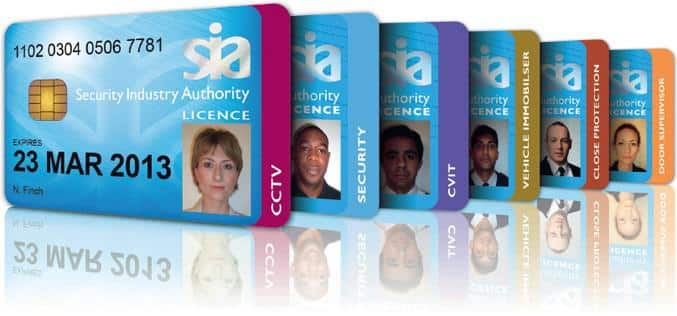A Comprehensive Guide to SIA Licences: Types and Differences
- Posted by my-licence
- Categories Blog «My-Licence»
- Date July 6, 2024
- Comments 0 comment

If you’re considering a career in the UK’s private security industry, you’ve likely come across the term “SIA Licence.” The Security Industry Authority (SIA) is the organization responsible for regulating the private security industry, ensuring that individuals and businesses meet required standards of training and conduct. To work in most security roles, having an SIA licence is mandatory. This article will guide you through the different types of SIA licences and the key differences between them.
✅What is an SIA Licence?
An SIA Licence is a permit issued by the Security Industry Authority that allows legally work in various security roles. The SIA’s primary goal is to raise the standards of professionalism and service within the industry, enhancing public safety and confidence.
✅Types of SIA Licences
There are several types of SIA Licences required to specific roles within the security industry. The main categories include:
- Front Line Licences
- Non-Front Line Licences
✅Front Line Licences
Front line licences are required for individuals performing duties involving direct interaction with the public. This category includes the following types of licences:
- Door Supervisor Licence
- Security Guard Licence
- CCTV (Public Space Surveillance) Operator Licence
- Close Protection Operative Licence
- Cash and Valuables in Transit (CVIT) Licence
A Door Supervisor licence allows to work in places where alcohol is served, such as pubs, nightclubs, and other licensed premises. This licence also covers security duties at events, concerts, and public gatherings. Holders can perform all functions of a security guard, but their training includes additional components on handling potentially aggressive situations.
A Security Guard licence is for individuals who perform guarding duties in various settings, including retail, corporate, and industrial environments. This licence does not permit the holder to work in establishments where alcohol is consumed unless they hold a Door Supervisor licence as well.
This licence is required for operating CCTV systems monitoring public or private spaces but not inside private residences. CCTV operators play very important role in detecting and preventing crime, ensuring public safety, and providing evidence for investigations.
A Close Protection Operative licence is for individuals providing personal protection services to clients, such as celebrities, politicians, or high-profile businesspeople. This role requires specialized training in risk assessment, defensive tactics, and emergency response.
Cash and Valuables in Transit (CVIT) Licence
The CVIT licence is for individuals responsible for the secure transportation of cash and other valuable items. This job often involves high-risk scenarios, requiring comprehensive training in security procedures and safe driving techniques.
✅Non-Front Line Licence
This licence cover activities such as managing a security company, overseeing security operations, and performing administrative tasks related to security services.
Key Holding Licence
The Key Holding Licence allows to manage and respond to alarm activations at various premises. Key holders provide an essential service by ensuring that properties are secure and responding promptly to security breaches.
✅Differences Between SIA Licences
While all SIA licences serve the common purpose of regulating and ensuring professionalism in the security industry, they differ based on:
- Nature of Duties:
Each licence authorizes specific activities. For instance, a Door Supervisor can engage in physical intervention, while a Security Guard cannot. - Training Requirements:
Different licences have unique training courses. Close Protection Training is more intensive compared to that for a Security Guard. - Work Environments:
The work environments differ significantly.
CCTV Operators typically work in control rooms, while CVIT Personnel are mobile. - Scope of Authority:
Some licences, like the Door Supervisor Licence, cover more activities and extra tasks compared to others, such as the Security Guard Licence.
✅How to Apply for an SIA Licence
To apply for an SIA licence, applicant must:
- Complete the Relevant Training:
Book and complete an SIA-Approved Training Course for the desired licence type. - Pass Identity and Criminal Background Checks:
The SIA will conduct checks to ensure the applicant is suitable for the role. - Submit an Application:
Applications can be submitted online through the SIA website. Applicants will need to provide personal details, proof of identity, and evidence of training completion.
✅Conclusion
Choosing the right SIA Licence depends on the specific security role you are interested in and the environment you wish to work in. Whether you want to become a Door Supervisor, CCTV Operator, or Close Protection Operative, understanding the requirements and responsibilities of each licence is important for a successful career in the security industry.
By getting the appropriate SIA licence, you’ll not only comply with legal requirements but also enhance your professional credibility and job prospects.
You may also like
SIA Licence Renewal and Refresher Qualifications: What to Expect in 2025
If your SIA Door Supervision Licence is set to expire in 2025, it’s time to start planning for renewal. Unlike some processes, your licence will not renew automatically. To continue working legally after the expiry date, you must renew it …
Everything You Need to Know About Getting a PCO Licence
If you’re looking to become a professional driver in London, you’ll need a Private Hire Vehicle (PHV) licence, commonly known as a PCO (Public Carriage Office) licence. This licence is essential for anyone who wants to drive minicabs, chauffeur services, …
Career Advantages of Holding an Alcohol Personal Licence
Introduction In the hospitality and retail industries, holding an Alcohol Personal Licence can significantly enhance your career prospects. This certification, legally required to sell or authorize the sale of alcohol in the UK, opens up a range of job opportunities, …
